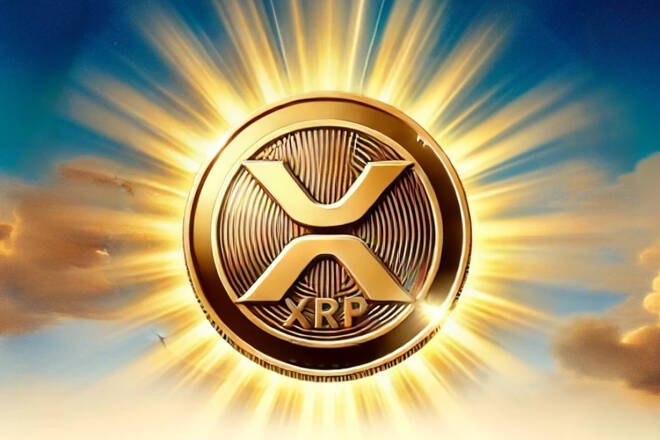Advertisement
Advertisement
XRP News Today: Settlement Chatter Intensifies After Court Ruling; BTC at Sub-$85k
By:
Key Points:
- Ripple’s joint motion to pause the SEC appeal fuels hopes for a Final Judgment settlement and ETF approval.
- Legal experts suggest the next court move could be to reduce Ripple’s fine and vacate the sales ban.
- Bitcoin holds at $84K despite sharp US stock sell-off and $200M in US BTC-spot ETF outflows.
Appeal Pause Fuels Settlement Speculation
The SEC vs. Ripple case took center stage on Wednesday, April 16, as investors digested the latest rulings from a four-year saga. US attorney James Filan shared news of the US Court of Appeals for the Second Circuit granting a joint motion to hold the appeal in abeyance.
The ruling was crucial. Ripple’s deadline for filing its appeal-related reply brief was April 16. Without the court’s approval, the appeal of the Programmatic Sales of XRP ruling would have proceeded.
Pro-crypto lawyer Fred Rispoli commented on the timing:
“Man talk about cutting it close! I hope one day Ripple Chief Legal Officer Stuart Alderoty tells us the brief was drafted, finalized and ready for filing today had this not come through!”
The ruling shifted focus to Judge Analisa Torres’ Final Judgment. In March 2025, Alderoty disclosed that a potential settlement of the Final Judgment was in progress, stating:
“Last week, the SEC agreed to drop its appeal without conditions. Ripple has now agreed to drop its cross-appeal. The SEC will keep $50M of the $125M fine (already in an interest-bearing escrow in cash), with the balance returned to Ripple. The agency will also ask the Court to lift the standard injunction that was imposed earlier at the SEC’s request. All subject to Commission vote, drafting of final documents and usual court processes.”
While a reduced fine would benefit Ripple, lifting the injunction against institutional XRP sales could be more significant, potentially accelerating XRP adoption in the US.
Legal Experts Fuel Speculation About a Final Judgment Settlement
Commenting on the joint motion, pro-crypto lawyer Bill Morgan stated:
“Now for a joint motion to Judge Torres to reduce the fine and vacate the injunction.”
Fred Rispoli added:
“With this order, the next move we will see is a filing in the district court – seeking to modify J. Torres’ order, i.e., lifting the injunction and reducing the fine.”
A Final Judgment settlement could mark the end of the appeals process and clear the path for an XRP-spot ETF—an outcome that may drive institutional demand for XRP.
Several issuers, including Bitwise, Canary Funds, 21Shares, Grayscale, Coinshares, WisdomTree, Franklin Templeton, Volatility Shares, Hashdex, MemX, Teucrium, and Proshares have already filed for XRP ETFs.
Amicus Curiae attorney John E. Deaton remarked on the Ripple case and the prospects of an XRP-spot ETF approval:
“The one prosecuted gets approved first!”
According to Kaiko Research, XRP leads all live crypto ETF applications:
XRP Outlook: Legal Developments and ETF Hopes
XRP slipped 0.03% on Wednesday, April 16, following Tuesday’s 2.02% loss, closing at $2.0831. It underperformed the broader crypto market, which gained 0.31%, taking the total crypto market cap to $2.61 trillion.
Investors are closely monitoring developments around the potential settlement and its impact on XRP’s ETF prospects. Price trajectory remains sensitive to the following drivers:
- SEC vs. Ripple Court Filings/Rulings: A settlement could send XRP toward its all-time high of $3.5505.
- XRP-Spot ETF Prospects: Institutional interest could rise sharply post-approval; delays may dampen momentum.
- Macroeconomic risks: Fed policy and U.S.-China trade tensions pose downside risks to $1.70 while easing conditions could support a move toward $3.00.
See our full XRP forecast here.
Bitcoin Resilience Amid Escalating Tariffs
While XRP slipped, bitcoin (BTC) trended higher despite an escalation in the US-China trade war. The US government announced 245% tariffs on select Chinese imports after China hiked levies on US imports to 125%. According to the White House press release, US President Trump also signed an Executive Order ‘launching an investigation into the national security risks posed by US reliance on imported processed critical minerals and their derivative products.’
US markets tumbled on April 16, with the Nasdaq Composite Index closing down 3.07%.
US BTC-Spot ETFs Face Outflows
Rising tensions dented institutional demand for BTC ETFs. According to Farside Investors, -key US BTC-spot ETF market flows for April 16 included:
- Fidelity Wise Origin Bitcoin Fund (FBTC) reported net outflows of $113.8 million.
- ARK 21Shares Bitcoin ETF (ARKB) saw net outflows of $113.2 million.
Excluding data from BlackRock’s (BLK) iShares Bitcoin Trust (IBIT), total US BTC-spot ETF outflows reached $201.7 million. While avoiding a drop below $80,000, Wednesday’s outflows left BTC struggling below the crucial $85,000 level.
BTC Price Outlook: Key Drivers
On April 16, BTC gained 0.39%, partially reversing Tuesday’s 1.09% loss to close at $84,032. Despite the US market sell-off, BTC avoided sub-$80,000 for five straight sessions.
Near-term price direction depends on the following scenarios:
- Bearish Scenario: Rising geopolitical tensions, weak US economic data, hawkish Fed rhetoric, spot ETF outflows, and legislative delays could send BTC toward $75,000.
- Bullish Scenario: Easing trade tensions, strong US stats, dovish Fed chatter, bipartisan support for the Bitcoin Act, and ETF inflows may lift BTC toward $90,000.
Market Outlook: Themes to Watch
Investors should track Ripple-related court developments, U.S.-China trade risks, macroeconomic indicators, Fed commentary, crypto ETF flows, and legislation like the Bitcoin Act. While Ripple’s legal progress offers short-term clarity, the broader crypto outlook still hinges on regulatory certainty and macroeconomic stability.
Explore what analysts believe is needed for cryptos to reach new highs.
About the Author
Bob Masonauthor
With over 28 years of experience in the financial industry, Bob has worked with various global rating agencies and multinational banks. Currently he is covering currencies, commodities, alternative asset classes and global equities, focusing mostly on European and Asian markets.
Advertisement
